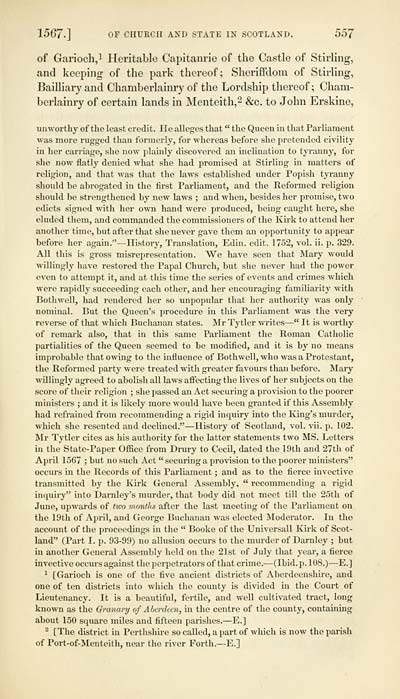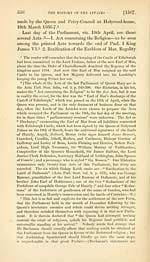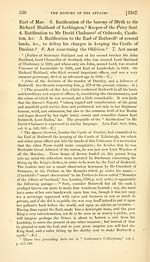Spottiswoode Society > History of the affairs of the Church and State of Scotland from the beginning of the reformation to the year 1568 > Volume 2
(581) Page 557
Download files
Complete book:
Individual page:
Thumbnail gallery: Grid view | List view

1567.] OF CHURCH AND STATE IN SCOTLAND. 557
of Garloch,^ Heritable Capitanrie of the Castle of Stirling,
and keeping of the park thereof; Sheriffdom of Stirling,
Bailliary and Chamberlainry of the Lordship thereof ; Cham-
berlainry of certain lands in Mcnteith,^ &c. to John Erskine,
unworthy of the least credit. He alleges that " the Queen m that Parliament
was more rugged than formerly, for whereas before she pretended civility
in her carriage, she now plainly discovered an inclination to tyranny, for
she now flatly denied what she had promised at Stirling in matters of
religion, and that was that the laws established under Popish tyranny
should be abrogated in the fii-st Parliament, and the Reformed religion
should be strengthened by new laws ; and when, besides her promise, two
edicts signed with her o^vn hand were produced, being caught here, she
eluded them, and commanded the commissioners of the Kirk to attend her
another time, but after that she never gave them an opportunity to appear
before her again." — History, Translation, Edin. edit. 1752, vol. ii. p. 329.
All this is gross misrepresentation. We have seen that Mary would
willingly have restored the Papal Church, but she never had the power
even to attempt it, and at this time the series of events and crimes which
were rapidly succeeding each other, and her encouraging familiarity with
Bothwell, had rendered her so unpopular that her authority was only
nominal. But the Queen's procedure in this Parliament was the very
reverse of that which Buchanan states. INIr Tytler writes — " It is worthy
of remark also, that in this same Parliament the Roman Catholic
partialities of the Queen seemed to be modified, and it is by no means
improbable that owing to the influence of Bothwell, who was a Protestant,
the Reformed party were treated with greater favours than before. IMary
willingly agreed to abolish all laws affecting the lives of her subjects on the
score of theu* religion ; she passed an Act securing a provision to the poorer
ministers ; and it is likely more would have been granted if this Assembly
had refrained from recommending a rigid inquiry into the King's murder,
which she resented and declined." — History of Scotland, vol. vii. p. 102.
Mr Tytler cites as his authority for the latter statements two MS. Letters
in the State-Paper Office from Drury to Cecil, dated the 19th and 27th of
April 1567 ; but no such Act " securing a provision to the poorer ministers"
occurs in the Records of this Parliament ; and as to the fierce invective
transmitted by the Kirk General Assembly, " recommending a rigid
inquiry" into Darnley's murder, that body did not meet till the 25th of
June, upwards of Hvo months after the last meeting of the Pai'liament on
the 19th of April, and George Biichanan was elected Moderator. In the
account of the proceedings in the " Booke of the Universall Kirk of Scot-
land" (Part I. p. 93-99) no allusion occurs to the murder of Darnley ; but
in another General Assembly held on the 21st of July that year, a fierce
invective occurs against the perpetrators of that crime. — (Ibid. p. 108.) — E.]
^ [Garioch is one of the five ancient districts of Aberdeenshu-e, and
one of ten districts into which the county is divided in the Court of
Lieutenancy. It is a beautiful, fertile, and well cultivated tract, long
known as the Granary of Aberdeen, in the centre of the county, containing
about 150 square miles and fifteen parishes. — E.]
^ [The district in Perthshire so called, a part of which is now the parish
of Port-of-Menteith, near the river Forth.— E.]
of Garloch,^ Heritable Capitanrie of the Castle of Stirling,
and keeping of the park thereof; Sheriffdom of Stirling,
Bailliary and Chamberlainry of the Lordship thereof ; Cham-
berlainry of certain lands in Mcnteith,^ &c. to John Erskine,
unworthy of the least credit. He alleges that " the Queen m that Parliament
was more rugged than formerly, for whereas before she pretended civility
in her carriage, she now plainly discovered an inclination to tyranny, for
she now flatly denied what she had promised at Stirling in matters of
religion, and that was that the laws established under Popish tyranny
should be abrogated in the fii-st Parliament, and the Reformed religion
should be strengthened by new laws ; and when, besides her promise, two
edicts signed with her o^vn hand were produced, being caught here, she
eluded them, and commanded the commissioners of the Kirk to attend her
another time, but after that she never gave them an opportunity to appear
before her again." — History, Translation, Edin. edit. 1752, vol. ii. p. 329.
All this is gross misrepresentation. We have seen that Mary would
willingly have restored the Papal Church, but she never had the power
even to attempt it, and at this time the series of events and crimes which
were rapidly succeeding each other, and her encouraging familiarity with
Bothwell, had rendered her so unpopular that her authority was only
nominal. But the Queen's procedure in this Parliament was the very
reverse of that which Buchanan states. INIr Tytler writes — " It is worthy
of remark also, that in this same Parliament the Roman Catholic
partialities of the Queen seemed to be modified, and it is by no means
improbable that owing to the influence of Bothwell, who was a Protestant,
the Reformed party were treated with greater favours than before. IMary
willingly agreed to abolish all laws affecting the lives of her subjects on the
score of theu* religion ; she passed an Act securing a provision to the poorer
ministers ; and it is likely more would have been granted if this Assembly
had refrained from recommending a rigid inquiry into the King's murder,
which she resented and declined." — History of Scotland, vol. vii. p. 102.
Mr Tytler cites as his authority for the latter statements two MS. Letters
in the State-Paper Office from Drury to Cecil, dated the 19th and 27th of
April 1567 ; but no such Act " securing a provision to the poorer ministers"
occurs in the Records of this Parliament ; and as to the fierce invective
transmitted by the Kirk General Assembly, " recommending a rigid
inquiry" into Darnley's murder, that body did not meet till the 25th of
June, upwards of Hvo months after the last meeting of the Pai'liament on
the 19th of April, and George Biichanan was elected Moderator. In the
account of the proceedings in the " Booke of the Universall Kirk of Scot-
land" (Part I. p. 93-99) no allusion occurs to the murder of Darnley ; but
in another General Assembly held on the 21st of July that year, a fierce
invective occurs against the perpetrators of that crime. — (Ibid. p. 108.) — E.]
^ [Garioch is one of the five ancient districts of Aberdeenshu-e, and
one of ten districts into which the county is divided in the Court of
Lieutenancy. It is a beautiful, fertile, and well cultivated tract, long
known as the Granary of Aberdeen, in the centre of the county, containing
about 150 square miles and fifteen parishes. — E.]
^ [The district in Perthshire so called, a part of which is now the parish
of Port-of-Menteith, near the river Forth.— E.]
Set display mode to: Large image | Transcription
Images and transcriptions on this page, including medium image downloads, may be used under the Creative Commons Attribution 4.0 International Licence unless otherwise stated. ![]()
| Permanent URL | https://digital.nls.uk/79611421 |
|---|
| Description | Volume II. |
|---|---|
| Attribution and copyright: |
|

